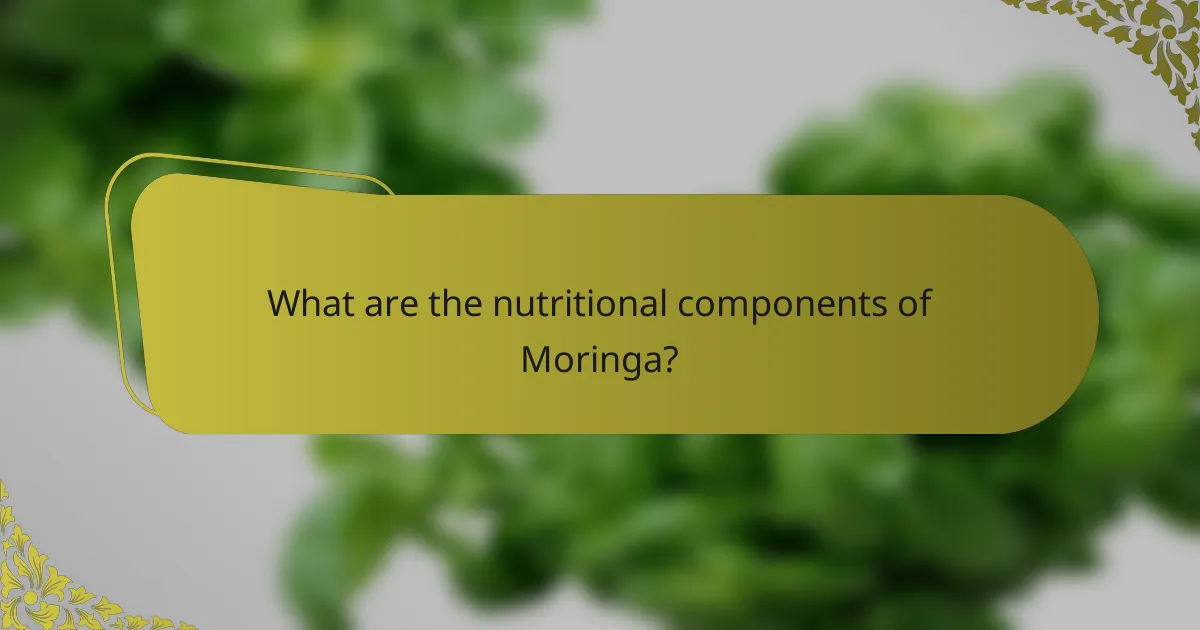Moringa is a nutritional powerhouse that enhances plant-based diets with its rich content of vitamins, minerals, and antioxidants. This article explores Moringa’s health benefits, including its high protein content and anti-inflammatory properties. It also discusses various ways to incorporate Moringa into meals for improved nutrition and overall wellness. Additionally, potential side effects and best practices for consumption will be covered.

What are the nutritional components of Moringa?
Moringa is rich in vitamins, minerals, and antioxidants, making it a nutritional powerhouse. It contains significant amounts of vitamin A, vitamin C, calcium, potassium, and protein. Moringa leaves provide 25 times more iron than spinach and 17 times more calcium than milk, highlighting its unique attributes. Its high antioxidant content helps combat oxidative stress, promoting overall health.
How does Moringa compare to other superfoods in nutrient density?
Moringa is more nutrient-dense than many other superfoods. It contains high levels of vitamins A, C, and E, along with essential amino acids and antioxidants. For example, Moringa leaves provide 25 times more iron than spinach and 15 times more potassium than bananas. This unique profile makes Moringa a powerful addition to plant-based diets, offering a broad spectrum of health benefits. Comparatively, while other superfoods like kale and quinoa also possess significant nutrients, Moringa’s exceptional concentration of vitamins and minerals sets it apart in terms of overall nutrient density.
What vitamins and minerals are abundant in Moringa leaves?
Moringa leaves are rich in vitamins A, C, and E, along with essential minerals like calcium, potassium, and iron. These nutrients contribute to various health benefits, including immune support and bone health. Moringa’s unique attribute is its high protein content, providing all nine essential amino acids, making it a valuable addition to plant-based diets.
Which amino acids are present in Moringa and why are they important?
Moringa contains essential amino acids, including leucine, isoleucine, and valine, which are vital for protein synthesis and muscle repair. These amino acids support various bodily functions, such as immune response and hormone regulation. Moringa’s unique profile makes it an excellent addition to plant-based diets, enhancing nutritional intake.

How does Moringa contribute to a plant-based diet?
Moringa significantly enhances a plant-based diet by providing essential nutrients and health benefits. This superfood contains high levels of vitamins A, C, and E, which support immune function and skin health.
Its protein content, approximately 25% by weight, makes it an excellent source of plant-based protein, ideal for those following vegetarian or vegan diets. Moringa also offers antioxidants that combat oxidative stress, promoting overall wellness.
Additionally, its unique attribute includes anti-inflammatory properties, which can aid in reducing chronic inflammation. Incorporating Moringa into smoothies, soups, or salads can enhance nutritional intake and diversify flavors in plant-based meals.
Why is Moringa considered a complete protein source?
Moringa is considered a complete protein source because it contains all nine essential amino acids. This unique attribute makes it particularly valuable in plant-based diets, where obtaining complete proteins can be challenging. Moringa’s protein content is approximately 25% by weight, offering a significant nutritional boost. Additionally, it provides essential vitamins and minerals, enhancing its role as a superfood in various dietary regimes.
How can Moringa enhance the nutritional profile of smoothies and dishes?
Moringa significantly enhances the nutritional profile of smoothies and dishes by adding essential vitamins, minerals, and antioxidants. Its high concentrations of vitamin C, iron, and calcium contribute to improved immune function and bone health. Moringa’s protein content, containing all nine essential amino acids, makes it an excellent addition to plant-based diets. Additionally, its unique phytonutrients, such as quercetin and chlorogenic acid, provide anti-inflammatory and antioxidant benefits, promoting overall health. Incorporating Moringa into meals can elevate both flavor and nutritional value, making it a versatile superfood for various culinary applications.
What are the best forms of Moringa for dietary inclusion?
The best forms of Moringa for dietary inclusion are powder, capsules, and fresh leaves. Moringa powder is versatile and easy to add to smoothies or meals. Capsules offer a convenient option for those who prefer not to taste the herb. Fresh leaves provide maximum nutritional benefits and can be used in salads or soups. Each form retains the unique attribute of Moringa’s rich nutrient profile, including vitamins A, C, and E, as well as antioxidants.

What health benefits are associated with Moringa consumption?
Moringa consumption offers numerous health benefits, including enhanced nutrition and disease prevention. This plant is rich in vitamins A, C, and E, which support immune function and skin health. Its anti-inflammatory properties may reduce chronic inflammation, while antioxidants combat oxidative stress. Moringa also aids digestion due to its high fiber content, promoting gut health. Additionally, it may help regulate blood sugar levels and lower cholesterol. Regular intake can contribute to overall well-being and vitality.
How does Moringa support immune function?
Moringa significantly supports immune function through its high levels of vitamins, minerals, and antioxidants. It contains vitamin C, which enhances immune response, and vitamin A, crucial for maintaining healthy mucous membranes. The unique attribute of Moringa is its rich concentration of flavonoids, which have anti-inflammatory properties that further boost immunity. Additionally, Moringa’s rare presence of compounds like benzyl isothiocyanate contributes to its ability to fight infections and enhance overall health.
What role does Moringa play in reducing inflammation?
Moringa plays a significant role in reducing inflammation due to its high concentration of antioxidants and anti-inflammatory compounds. Studies indicate that Moringa oleifera contains quercetin and chlorogenic acid, which help lower inflammatory markers in the body. Additionally, Moringa’s rich nutrient profile supports overall health, potentially enhancing the body’s ability to manage inflammation. Regular consumption of Moringa can contribute to improved joint health and reduced symptoms of inflammatory conditions.
Which studies support Moringa’s effects on blood sugar levels?
Several studies indicate that Moringa may help lower blood sugar levels. Research shows that Moringa leaf extract can significantly reduce fasting blood glucose levels. For instance, a study published in the Journal of Food Science demonstrated that Moringa leaves have hypoglycemic effects in diabetic rats. Another clinical trial found that participants who consumed Moringa experienced improved glycemic control. These findings suggest that Moringa could be beneficial for managing blood sugar levels in individuals with diabetes.

How can Moringa be incorporated into daily meals?
Moringa can be easily incorporated into daily meals through various methods. Add fresh Moringa leaves to salads for a nutritious boost. Blend Moringa powder into smoothies for added vitamins. Use Moringa powder in soups and stews for enhanced flavor and nutrition. Incorporate Moringa into baked goods like muffins or energy bars for a healthy twist. Finally, steep Moringa leaves in hot water to create a herbal tea that offers numerous health benefits.
What are some easy recipes using Moringa powder?
Moringa powder can be easily incorporated into various recipes. Here are some simple ideas:
1. Moringa Smoothie: Blend one banana, one cup of spinach, one tablespoon of Moringa powder, and one cup of almond milk for a nutritious drink.
2. Moringa Energy Balls: Mix one cup of oats, one tablespoon of Moringa powder, half a cup of nut butter, and honey. Roll into balls and refrigerate.
3. Moringa Soup: Sauté onions and garlic, then add vegetable broth, chopped vegetables, and one tablespoon of Moringa powder. Simmer until vegetables are tender.
4. Moringa Pancakes: Combine one cup of flour, one tablespoon of Moringa powder, baking powder, and milk. Cook on a skillet until golden brown.
5. Moringa Salad Dressing: Whisk together olive oil, lemon juice, one teaspoon of Moringa powder, salt, and pepper for a vibrant dressing.
How can fresh Moringa leaves be used in cooking?
Fresh Moringa leaves can be used in cooking by adding them to salads, soups, and smoothies for enhanced nutrition. They provide a rich source of vitamins A, C, and E. Cooking methods include sautéing, steaming, or blending. Moringa leaves retain their nutritional value when lightly cooked, making them versatile in plant-based diets. Their unique flavor complements various dishes, enriching meals with a nutrient-dense ingredient.
What are creative ways to include Moringa in snacks?
Moringa can be creatively included in snacks through various methods. Incorporate Moringa powder into energy balls, smoothies, or protein bars for a nutritional boost. Use fresh Moringa leaves in salads or as a garnish on soups. Moringa can also enhance the flavor of dips, such as hummus or guacamole. Additionally, blend Moringa with nut butters for a nutritious spread on toast or crackers.

What unique properties does Moringa offer compared to other plants?
Moringa offers unique properties such as high levels of vitamins A, C, and E, which are not commonly found in other plants. Its leaves provide a complete protein source, containing all essential amino acids. Moringa is also rich in antioxidants, particularly quercetin and chlorogenic acid, which help combat oxidative stress. Additionally, it contains rare compounds like niazimicin, known for its potential anti-cancer properties. These attributes make Moringa a standout in plant-based nutrition.
What is the significance of Moringa’s antioxidant content?
Moringa’s antioxidant content is significant for its ability to combat oxidative stress and reduce inflammation. Rich in compounds like quercetin and chlorogenic acid, Moringa supports overall health by neutralizing free radicals. This property contributes to its potential in preventing chronic diseases, enhancing immune function, and promoting skin health. Regular consumption can lead to improved vitality and longevity, making Moringa a valuable addition to plant-based diets.
How does Moringa’s cultivation impact its nutritional quality?
Moringa’s cultivation significantly enhances its nutritional quality. Factors such as soil health, climate conditions, and agricultural practices directly influence its nutrient density. For example, organic farming methods increase levels of vitamins and minerals in Moringa leaves. Additionally, the timing of harvest impacts the phytochemical profile, with younger leaves generally being richer in nutrients. Proper irrigation and pest management also contribute to maintaining high nutritional standards.

What are the potential side effects or considerations when using Moringa?
Moringa may cause mild side effects, including digestive issues, nausea, and headaches. Individuals should consider potential interactions with medications, particularly blood thinners and diabetes drugs. Pregnant or breastfeeding women should consult a healthcare provider before use.
Are there any contraindications for certain populations?
Certain populations should exercise caution when consuming Moringa due to potential contraindications. Pregnant and breastfeeding women may experience adverse effects, as limited research exists on Moringa’s safety during these periods. Individuals with low blood pressure or those on blood-thinning medications should also consult healthcare professionals, as Moringa may lower blood pressure and enhance anticoagulant effects. Lastly, people with allergies to plants in the Moringaceae family should avoid Moringa to prevent allergic reactions.
What dosage is recommended for optimal benefits?
For optimal benefits, a daily dosage of 1 to 2 teaspoons of Moringa powder is recommended. This amount provides essential nutrients while minimizing potential side effects. Moringa is rich in vitamins A, C, and E, which contribute to its health benefits. Additionally, starting with a lower dosage and gradually increasing can help individuals assess their tolerance.

What are expert tips for maximizing the benefits of Moringa?
To maximize the benefits of Moringa, incorporate it into daily meals, use fresh leaves or powder, and combine it with other nutrient-rich foods.
1. Start with small amounts to assess tolerance.
2. Add Moringa powder to smoothies for an energy boost.
3. Use fresh leaves in salads or soups for added nutrients.
4. Pair Moringa with healthy fats like avocado for better absorption of vitamins.
5. Consume regularly to experience cumulative health benefits.
6. Consider organic sources to ensure quality and purity.
How to choose the best quality Moringa products?
To choose the best quality Moringa products, prioritize organic certification, nutrient content, and sourcing practices. Look for products with high levels of vitamins, minerals, and antioxidants. Check for third-party testing to ensure purity and potency. Consider forms of intake such as powder, capsules, or tea based on personal preferences.
What common mistakes should be avoided when using Moringa?
Avoiding common mistakes with Moringa ensures you maximize its nutritional benefits. Key mistakes include using excessive amounts, neglecting potential interactions with medications, and consuming it without proper preparation.
1. Overconsumption: Taking Moringa in excessive quantities can lead to digestive issues.
2. Ignoring allergies: Some individuals may have allergic reactions; testing a small amount first is advisable.
3. Skipping cooking: Raw Moringa may contain antinutrients; cooking can enhance nutrient absorption.
4. Neglecting hydration: Moringa can have a diuretic effect; drinking enough water is essential.
5. Disregarding sourcing: Ensure Moringa is sourced from reputable suppliers to avoid contamination.
By avoiding these mistakes, you can effectively incorporate Moringa into your plant-based diet.
How to store Moringa to preserve its nutrients?
Store Moringa in a cool, dark place in an airtight container to preserve its nutrients. Avoid exposure to heat and moisture, which can degrade its quality. For long-term storage, consider freezing Moringa leaves or powder. This method retains its nutritional benefits, such as vitamins A, C, and E.
